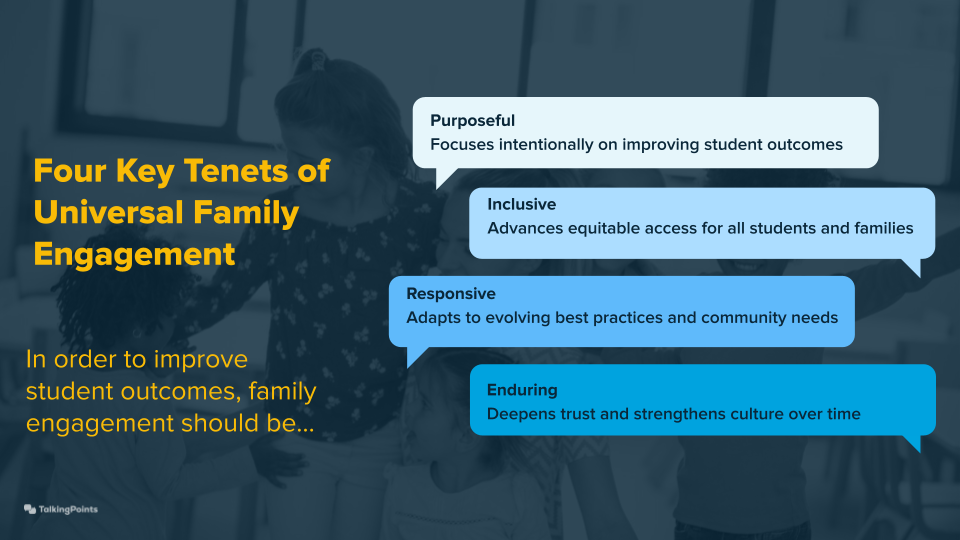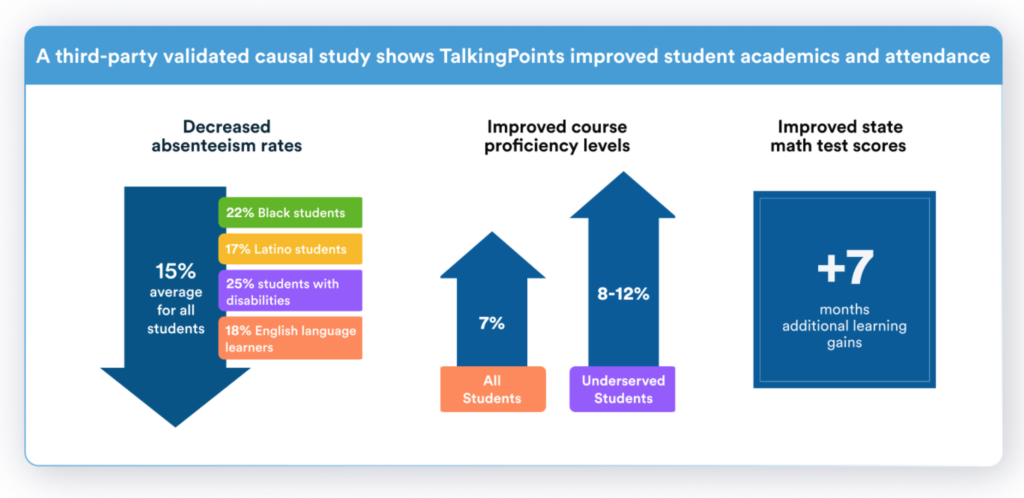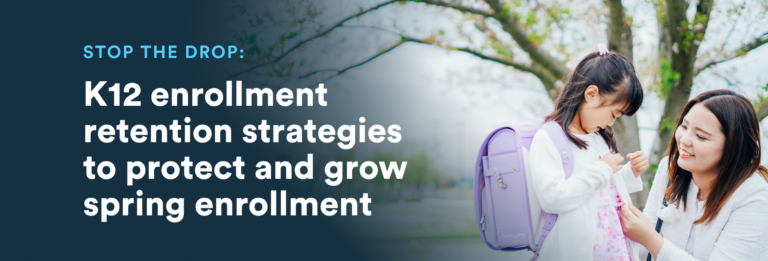Written by Kate Pechacek
Universal Family Engagement defined
Universal Family Engagement is the practice of improving outcomes for all students by fostering effective partnerships between schools and families. Universal Family Engagement focuses on removing barriers to both in-person and digital engagement with all families, including challenges related to capacity, mindset/confidence, culture, language, technology, and time.
To be successful, educators must build trusting relationships with families through consistent, asset-based interactions, where they capitalize on families as the student’s first teacher, strongest advocate, and student expert. Schools that harness the superpower of effective family partnerships can significantly accelerate the impact of their efforts to improve student learning and development.
The four tenets of Universal Family Engagement

To be effective, family engagement practices need to adhere to four foundational tenets:
Purposeful – guided by research-based best practices with an intentional focus on improving student outcomes and embedded as a strategy in a school system’s outcome-focused initiatives
Inclusive – built with universal design principles to ensure access for all families, especially those who are hardest to reach and underserved, by addressing and overcoming barriers
Enduring – focused on deepening mutual trust, building teacher and family capacity, and strengthening school culture through sustained and reliable engagement among teachers, staff, and schools
Responsive – adaptive to evolving student and family needs, as well as new research on proven family engagement best practices, emphasizing flexibility to align with a school district’s changing structure and community needs
When these four conditions are systematically in place across a school district, research shows that student performance improves and school systems become more effective.
Tenet #1 – Purposeful engagement
While it may seem like common sense, school districts that aim to improve student outcomes through family engagement must ensure that the engagement is intentionally centered on those outcomes. Too often, however, this principle is not reflected in practice. The shift from viewing family engagement as an end goal to using it as a powerful strategy for driving student success requires a change in what that engagement looks like. There are proven best practices for aligning engagement efforts with academic outcomes.
Attendance
Good attendance is the foundation, and often a dependency for the effectiveness, of nearly every other school-based support. Effective methods of addressing attendance issues are proactive, are rooted in a better understanding of students and their families, and can result in more trusting family-school partnerships.
It is important to engage in universal Tier 1 family engagement, with all families, in regards to attendance, for learning and prevention of attendance issues, as much as it is important to reach out to families of students with attendance issues. Tier 1 attendance support should include:
- Information about the importance of attendance
- Guidance and resources for families about how to improve and maintain good attendance
- Research-based best practices to build strong relationships between families and schools
Well-being
Effective family engagement for improving student well-being involves creating supportive interactions and using technology thoughtfully. To maximize impact, strategies should focus on:
- Encourage at-home tech use that supports belonging and well-being, while balancing in-school and home use
- Keep strategies simple and easy to fit into daily routines
- Support joint student-family activities that build connection and track progress.
- Include opportunities for self-expression and community-building.
Behavior
To effectively support family engagement to improve student behavior, support should include:
- Support clear family-school communication on behavior expectations and progress
- Share school practices and practical strategies to help families support positive behavior at home
- Align behavior management with tools for family-teacher coordination
- Celebrate behavior wins with features that track and reward progress
Academics

Elementary
There are a few key criteria for family engagement that best condition positive academic outcomes for elementary school students:
- Activities should focus on education and development of the student, not reteaching the skills being taught at school
- Activities should be supported not only by clear direction, but also by clear modeling, and if possible, a chance for families to practice the activity before engaging their child
These notable best practices for families of elementary students can be shared directly with families at the beginning of a new school year, and shared individually throughout the school year as friendly reminders.
- Create a daily routine with time for homework, reading, and play. This helps your child feel secure and organized.
- Celebrate small achievements to build confidence and make learning enjoyable!
- Show interest in what your child is learning by asking about their favorite parts of the day.
- Talk about your child’s schoolwork by asking what they enjoy and any areas where they might need extra help. Find out what support is available at school.
- Review progress with teachers at regular intervals to keep track of their development.
- Help your child understand the importance of asking for help by keeping communication with teachers open.
Secondary
At-home homework support or direct support for academic standards content is not generally considered an effective practice of support for students at the secondary level.
However, these best practices for families of secondary students can be shared directly with families at the beginning of a new school year, and then shared individually throughout the year as friendly reminders.
- Reinforce the importance of attending school and staying engaged in classroom activities
- Show interest in course selection by asking students questions about course options. “What courses are you interested in? Why are these classes important?”
- Ask students about course progress. “What are you doing well in? What do support do you need?”
- Ask students about academic progress twice a month. Check in with posted grades monthly.
- Encourage students to seek support for themselves when they need it.
- Consider including the student when reaching out to school staff about academics so the student maintains ownership for their learning
TalkingPoints supports purposeful engagement for specific student outcomes. The impact of the use of the TalkingPoints platform has been validated by rigorous, externally validated causal research showing TalkingPoints leads to higher academic performance, lower absenteeism, and gap closure in both areas, as shown below.

TalkingPoints has the power to improve outcomes in your district! To learn more about our Universal Family Engagement platform and effective family engagement strategies, visit TalkingPoints.



